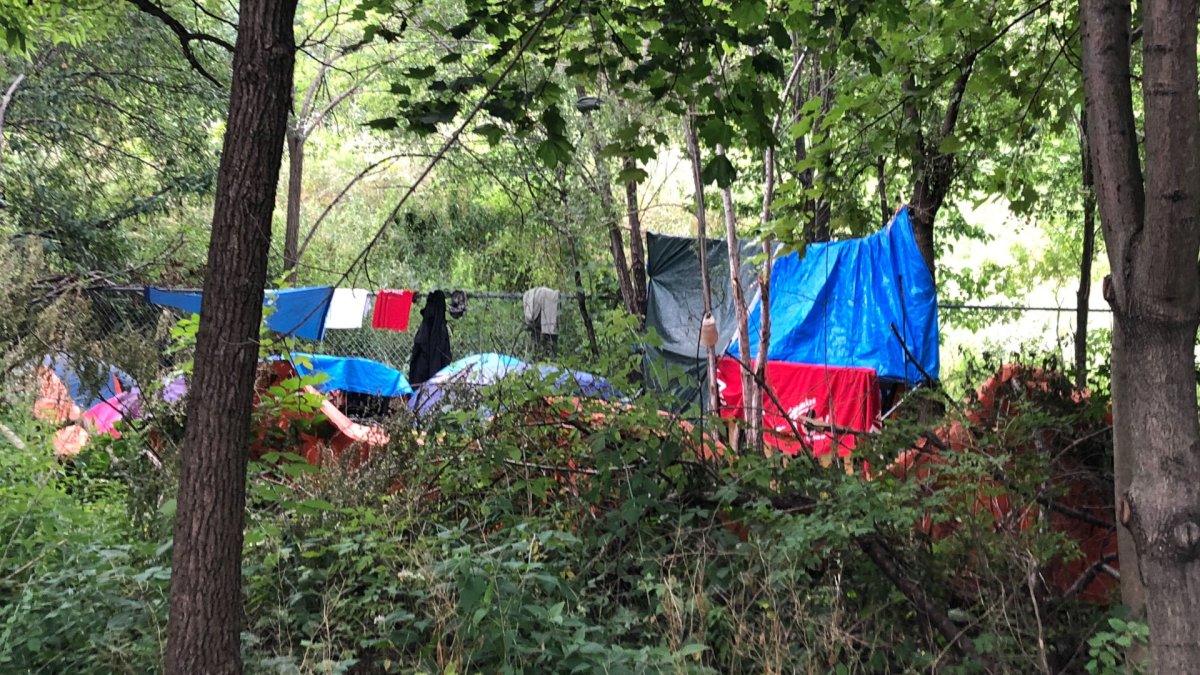A Hamilton councillor says a road trip across Southern Ontario is a “tale of two cities” in terms of dealing with the growing number of “tent-cities” in municipalities amid the COVID-19 pandemic.

Downtown councillor Jason Farr says he’s hoping the venture will teach him a little more about the nature of Hamilton’s spike in homeless sites in recent months.
“I am talking to you from Kitchener, Waterloo where just today after a week’s notice, they are dismantling an encampment here,” Farr told Global News. “Then I’ll be heading to London where, during the COVID-19 crisis, they’re actually permitting outside their downtown core encampments, at least temporarily.”
New encampments around Hamilton have been on the rise since the pandemic began. In May and June, the city tore down two large encampments, one not far from the General Hospital at Jackie Washington Rotary Park and another at the former John A. McDonald Secondary School downtown.
However, the tear-downs did not solve the problem as more encampments popped up in other spots including on the escarpment rail trail, on Ferguson Avenue between Camden and Barton Streets and in Farr’s constituency on York Street where he says he counted nine tents on Tuesday night.
“That is not a sanctioned outdoor encampment facility. There are no sanctions by the city of Hamilton or council for outdoor encampments in the city,” Farr said.
Hamilton has been dealing with an increase in homelessness during the pandemic in a number of ways including the set up of a men’s homeless shelter at rink level of First Ontario Centre – operated by Good Shepherd – and an encampment task force dismantling unsanctioned sites through collaboration with housing services, bylaw officers, police, and paramedics.
Mayor Fred Eisenberger says “tent-cities” are a “difficult challenge” due to many occupants refusing the city’s help to place them in stable housing environments.

Get weekly health news
“There are some people that will not go,” Eisenberger told Global News. “That’s their decision. They decide that they want to find another way of living.”
The problem for the city, according to the mayor, is the “unsanitary” nature of most encampments which would not only have an adverse effect on those living in them but potentially others living in nearby residential neighbourhoods.
“I don’t want them to become, you know, slums of tent cities that cause potentially all kinds of different problems, including the potential spread of this virus,” Eisenberger said.
The mayor says the city has had to pick up “the slack” on social services funding he says the province has reduced in recent times. That funding and the pandemic has stretched city finances which could have been directed to more shelters for the homeless.
“This is a long term issue and it needs sustainable funding contributions from all levels of government to be able to deal with this. So this is not just a Hamilton issue –this is a national issue,” said Eisenberger.
- Canada approves Moderna’s RSV vaccine, first of its kind for older adults
- ‘More than just a fad’: Federal petition seeks tax relief for those with celiac disease
- ‘Huge surge’ in U.S. abortion pill demand after Trump’s election win
- New Brunswick to allow medicare to pay for surgical abortions outside hospitals
Nadine Watson, a staff lawyer with the Hamilton Community Legal Clinic, agrees the issue is a “dilemma” and echoes the mayor’s sentiments about the dangers of an encampment around the COVID-19 pandemic.
Watson says advocates for the homeless have been citing the country’s human rights code and recent United Nations documentation that suggests encampments should not be dismantled during a pandemic because it is a public health risk.
“So the dilemma is, essentially, that you have these encampments popping up in the city of Hamilton and you’ll have your constituents who aren’t really happy, and then you’ll have other groups who have been advocating since the beginning of this pandemic that encampments not be dismantled,” said Watson.
The legal clinic says it’s not advocating for a permanent encampment in the city but arranging secured spaces such as shelters, hotels, interim and permanent housing, or another innovative solution.
“We’re asking for just innovation, some innovative solutions to the issue, like low-barrier and accessible spaces for folks to go to, or an exemption in the bylaws to allow for people to pitch tents,” Watson said.
Hamilton’s emergency operations centre (EOC) director Paul Johnson says the idea of allowing encampments within’ Hamilton during the pandemic is strewn with a number of logistical problems.
“You know, it has so many tentacles to it. Not the least of which are funding and staffing,” said Johnson. “Who’s going to support that and what other bylaws would be removed from that?”
Lisa Nussey of Keeping Six and the Harm Reduction Team hopes that the sight of homelessness being seen across the city will bring an “acknowledgment that there are sort of systematic issues” contributing to the problem.
“Well, yes, encampments are more visible and they do make us more uncomfortable, those of us who don’t live in those kinds of circumstances, but, they are all of our collective responsibility,” Nussey said.














Comments